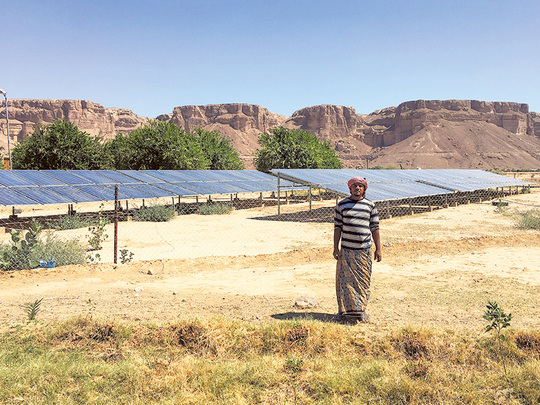
Wadi Dawan: Thanks to solar power pumps, production at this farm in Wadi Dawan and several other farms in Yemen’s province of Hadramout has not stopped despite suffering from massive diesel shortage due to the ongoing war in the country.
The farm, located in the eastern gate of Wadi Dawan along an arid stream, is known for two reasons: its premium honey and being the ancestral home of Osama Bin Laden’s father.
When he first began working here, Abdul Rahman Al Sakuti remembers how he used to spend countless hours irrigating the farm.
“I used to spend the early hours of the day on diesel pumps; fill in fuel, and start them manually. When the machines broke down, we used to wait for hours or days for engineers to repair them,” Al Sakuti told Gulf News.
During the latest cycle of violence in the poverty-stricken country where diesel became scarce, farmers had either to buy fuel at exorbitant prices from the black market or halt farm production altogether.
But Al Sakuti took advantage of large cash incentives given by the government a few years ago to encourage farmers to invest in solar power pumps in order to curb reliance on diesel.
The renewable energy system has made lives of the farmers much easier.
“Now, when the sun shines, the pumps automatically switch on and the water flows into the farm. We do not even bother to look at them,” Al Sakuti said.
Now, Hadramout’s long agricultural valley is strewn with solar panels as far as the eye can see.
Farmers here say that the solar power has boosted production as there is plenty of water and farmers are able to spend more time on the crops.
“The solar power water pumps have definitely boosted crop production. We are able to irrigate them daily.
Aimed at helping farmers across Yemen to covert to the green energy, the government kicked off a programme in 2014 to subsidise solar power pumps and panels.
Through a local state-run bank, the government would pay 25 per cent of the price of the solar system if the farm’s owner would pay the total cost upfront.
Landlords who could not afford the upfront payment were able to take an interest-free loan and the government would slash 10 per cent for those who could pay it back in two years and five per cent if they could pay it back in three years.
Omar Saeed Bin Frijan, an engineer who runs a solar power company called Al Wadi, told Gulf News that many people took advantage of the government incentive in order to ditch costly diesel pumps.
“During the early months of programme, we used to install five pumps monthly as demand was very high,” he said.
But many others hesitated to apply for the government loan due to the high initial cost of the system.
The cost of installing a 15kw solar-powered pump in August 2014 cost $28,000.
But the farmers who acted on time have saved thousands of dollars as they dodged high diesel and oil prices and maintenance costs.
But, only a few months after approving the programme it was suspended as Yemen erupted into civil war.
To the disappointment of many farmers, the government called off the incentive programme when the war broke out early 2015.
Many unlucky farmers who did not have the solar panels yet were forced to shut down operations.
Al Sakuti said that his landlord used the money they saved from diesel and repairs to buy more solar power pumps.
Since it began operations in June 2013, Frijan’s company has installed 58 solar power systems in different places in Hadramout.
Not only are they useful for farmers, but they are also used to pump drinking water for residents.
But, the number of solar power systems is relatively low compared to the hundreds of diesel-generated pumps throughout Yemen.
“While people knew that it was a smart investment and operational costs would be zero, most could not afford to buy them,” Frijan said.
“The government should revive the programme,” he added.
Despite the host of benefits of using the renewable energy system, some critics say that if farmers excessively pump water to irrigate their farmland, then the country’s underground reservoirs would be in danger of depletion.
“The farmers are not up to date on how to use modern irrigation systems,” Salem Buraji, the director of ministry of agriculture in Hadramout’s Wadi Dawan, told Gulf News.
“They still use mud furrow instead of plastic pipes to irrigate crops. With furrows, there is high water loss due to leaks and evaporation.”
To convince farmers to adapt more efficient irrigation systems, Buraji’s office have invited them to visit small model farms.
“By adopting smart agricultural practices, farms can boost production and profits without wasting water.”












